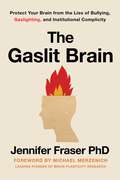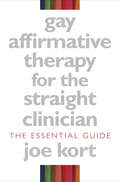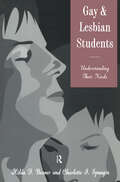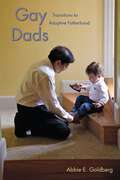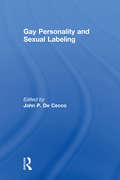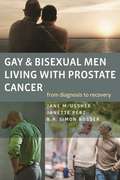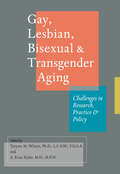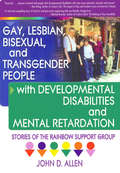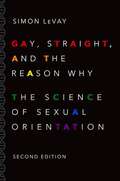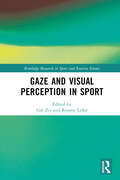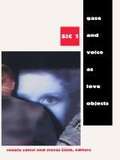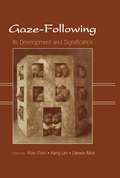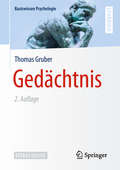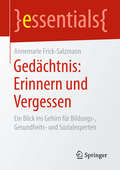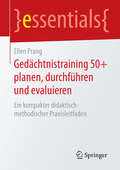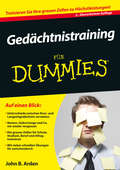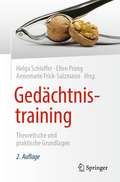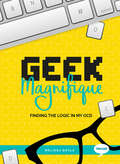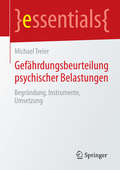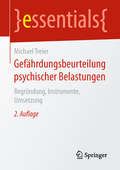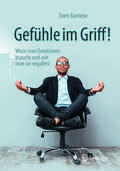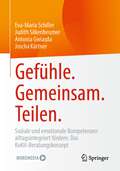- Table View
- List View
Gaslit Brain: Protect Your Brain from the Lies of Bullying, Gaslighting, and Institutional Complicity
by Jennifer Fraser PhDReveals the psychological functions of the manipulator&’s brain and the impact of gaslighting on our minds, shining a spotlight on how manipulative brains seduce us into belief and disrupt our ability to think effectivelyThis psychological study analyzes the onslaught of gaslighting that has recently dominated the world stage, making many turn to the dictionary just to figure out how it works, who&’s at risk, and why it&’s becoming normalized. When power, credibility, and social status are harnessed to manipulate—not just individuals—but whole populaces may suffer violence against facts and truth. Our recent concern with gaslighting&’s destructive force has made psychological safety a priority in relationships at home and at work. In PART ONE, we look at the impact gaslighting has on targets&’ brains and minds. Many do not realize that gaslighting has an extremely harmful neurological impact. If manipulation leads to insanity, it&’s because the brain and mind have been distorted and compromised. With the advent of non-invasive technology, scientists use brain imagery to examine what happens to brains that are lied to, manipulated, and betrayed. The damage is physical and visible and provides insights into why the mind&’s functions are compromised. PART TWO lasers in on the brains of those who bully and gaslight. Many do not realize that those who lie and manipulate have deficits in their brains. If manipulation leads to insanity, it&’s because the brain and mind have been distorted. With the advent of non-invasive technology, scientists use brain imagery to examine what's going on in the brains of bullies and gaslighters and why they're so effective. The damage is physical and visible, and it provides insights into why the mind&’s functions are compromised, destructive, and dangerous.PART THREE is practical and applicable. It teaches how to harness psychology and neuroscience to stay safe and sane. It provides proven exercises to keep us sharp and skeptical when faced with every manipulation from smear campaigns to spin doctors. It provides the tools needed to maintain clarity when exposed to those who are sowing the seeds of confusion and destabilization in an attempt to shatter our brains and lives. We can strengthen our brains and minds&’ capacity to recognize and resist falsehoods, level by level, mechanism by mechanism, function by function. PART THREE of The Gaslit Brain turns the psychological and brain research into practical, applicable strategies that anyone can apply to identify and resist the manipulation of gaslighting.
Gautama Buddha: Education for Wisdom
by Zane M. DiamondThis book examines some of the key elements of Buddhist education theory, in particular about educating for wisdom, the ultimate goal of Buddhist education. The teachings of Gautama Buddha have endured for thousands of years carried into the present era in schools, universities, temples, personal development courses, martial arts academies and an array of Buddhist philosophical societies across the globe. Philosophically, the ideas of the Buddha have held appeal across many cultures, but less is known about the underlying educational theories and practices that shape teaching and learning within Buddhist-inspired educational contexts. The chapters outline the development of the Buddha’s teachings, his broad approach to education and their relevance in the 21st century. Subsequently, the book reviews the history of the evolution of the various schools of Buddhist thought, their teaching and learning styles and the dissemination among Asia and later also the Western countries. The book discusses education theories and devices embedded within the Buddhist teachings, examining the works found in the Tipitaka, the Buddhist canon.
Gay Affirmative Therapy for the Straight Clinician: The Essential Guide
by Joe KortAll the answers straight clinicians need to work effectively with gay and lesbian clients. It has been over three decades since the American Psychiatric Association removed homosexuality as a category of deviant behavior from the DSM. Same-sex marriage is recognized in certain states, gay-straight alliances are springing up in high schools across the country, and major religious denominations are embracing gay clergy. Yet despite the sea change of attitudes toward homosexuality, many well-meaning straight therapists are still at a loss as to how to effectively counsel their gay and lesbian clients. This book will offer straight therapists the tools they need to counsel gay and lesbian clients effectively.
Gay And Lesbian Students: Understanding Their Needs
by Charlotte I. Spungin Hilda F. BesnerIn an average US secondary school 10% of the student population is homosexual, yet only a small number of American school districts have taken positive steps to address the problems associated with gay and lesbian students in the predominantly heterosexual educational setting. This book aims to raise awareness of the problems encountered by these adolescents in schools and of the effects of these problems on the dropout rate, academic achievement, substance abuse, AIDS, teenage pregnancy, school violence and suicide.; Designed to promote understanding and dispel myths about gay and lesbian tennagers, the volume also makes curriculum suggestions to advocate self-acceptance and tolerance and to reduce homophobia among heterosexual teenagers. It seeks to explain how institutional homophobia has affected the belief system and behaviour of a large segment of the American population. Various themes concerning the origins of sexual development are discussed, as is information concerning students who are children of gay and lesbian parents.
Gay Dads: Transitions to Adoptive Fatherhood (Qualitative Studies in Psychology #6)
by Abbie E. GoldbergWhen gay couples become parents, they face a host of questions and issues that their straight counterparts may never have to consider. How important is it for each partner to have a biological tie to their child? How will they become parents: will they pursue surrogacy, or will they adopt? Will both partners legally be able to adopt their child? Will they have to hide their relationship to speed up the adoption process? Will one partner be the primary breadwinner? And how will their lives change, now that the presence of a child has made their relationship visible to the rest of the world? In Gay Dads: Transitions to Adoptive Fatherhood, Abbie E. Goldberg examines the ways in which gay fathers approach and negotiate parenthood when they adopt. Drawing on empirical data from her in-depth interviews with 70 gay men, Goldberg analyzes how gay dads interact with competing ideals of fatherhood and masculinity, alternately pioneering and accommodating heteronormative “parenthood culture.” The first study of gay men's transitions to fatherhood, this work will appeal to a wide range of readers, from those in the social sciences to social work to legal studies, as well as to gay-adoptive parent families themselves.
Gay Personality And Sexual Labeling: Critical Clinical Issues
by John Dececco, PhdAre scientists--who by definition are supposed to be objective and clinical in their theories--actually assuming common cultural prejudices and moral standards when it comes to their research on homosexuality? Some of the best minds in sexual liberation take a hard look at how homosexuality is still defined and viewed by established schools of thought and propose fascinating and often controversial ideas on the true nature of the gay personality and identity. This challenging book explores how gay people can “label” themselves or avoid the gay label entirely while still being homosexual, as well as how others label gay people.
Gay and Bisexual Men Living with Prostate Cancer: From Diagnosis to Recovery
by Jane Ussher Perz Janette Rosser B. R. SimonThis book provides an overview of research and practice dealing with the specific needs of gay and bisexual men living with prostate cancer, as well as the special psychosocial needs of their partners. The intention is twofold: to provide insight into the unique experiences and concerns of gay or bisexual men living with prostate cancer in order to inform and assist future research, clinical practice and supportive care, and policy; and to ensure that the needs of gay and bisexual men are recognized and advanced on the mainstream prostate cancer agenda. Featuring both cutting-edge research and powerful portraits of gay and bisexual men living with prostate cancer, this book will be indispensable for health care, oncology, and mental health practitioners who seek to address their specific experiences and challenges.
Gay, Lesbian, Bisexual, and Transgender Aging: Challenges in Research, Practice, and Policy
by Tarynn M. WittenThe graying of the U.S. population draws increasing focus to historically unattended segments of society, including sexual and gender minorities. In this first comprehensive volume to address the challenges of aging in the gay, lesbian, bisexual, transgender, and intersex populations, this text presents what is currently known about aging GLBT individuals and what services are needed to support them. The editors first provide an introductory overview comparing caregiving in GLBT and normative aging communities. In chapters devoted to the issues of each alternative sexuality and gender identity community, top experts in the field discuss biomedical, psychological, social/sexual, spiritual, socioeconomic, and service topics related to that community's aging needs. GLBT populations face unique challenges as they age. Despite the often severe difficulties they encounter, many live out their final years with the dignity and grace that all of us deserve. With a combination of the latest biological and social science research, moving case studies and first-person accounts, practical advice for health professionals, and research literature citations, this book represents a major step forward in addressing concerns of aging GLBT populations. Integrating research, practice, and policy, this text is for students and professionals in gerontology, medicine, social work, psychology, nursing, public health, and related fields who wish to learn more about the life experiences and concerns of sexual- and gender-minority-identified older patients.
Gay, Lesbian, Bisexual, and Transgender People with Developmental Disabilities and Mental Retardatio: Stories of the Rainbow Support Group
by John D AllenExperience the birth of the first support group for sexual minorities with developmental disabilities! Reflecting an unprecedented development in the disabled and sexual minority communities, Gay, Lesbian, Bisexual, and Transgender People with Developmental Disabilities and Mental Retardation: Stories of the Rainbow Support Group describes the founding, achievements, and history of a unique group providing support for people with developmental disabilities or mental retardation (DD/MR) who are gay, lesbian, bisexual, and transgender. In this pathbreaking book, group founder John D. Allen describes the Rainbow Support Group's beginnings in 1998 at the New Haven Gay & Lesbian Community Center in Connecticut and the ways in which it has been shattering myths and stereotypes surrounding people with mental retardation ever since. From the author: "Not only are people with DD/MR full human beings with the same needs and desires for intimacy and healthy sexual expression as people without intellectual disabilities, but the group is evidence that some people with DD/MR have an understanding of sexual orientation as well. Acknowledging that people with mental retardation are sexual is a new development in the human service field, but one that is still in the pre-Stonewall days regarding those who are gay. Although people with mental retardation are given unprecedented freedom to make personal vocational decisions, there is an unfounded expectation that they do not have a sexuality-let alone a homosexuality. Members of the Rainbow Support Group discuss the same concerns as other gay people, but in a support system that recognizes their unique perspective." This insightful book shows how membership in the Rainbow Support Group addresses the very real fears and concerns of its members, including: being forced into heterosexual social situations, since that is the only available option for socialization dealing with being "outed" to peers and staff-since many DD/MR people are not their own legal guardians, this can lead to removal of privileges, various kinds of abuse, and other negative consequences in their day-to-day lives being ridiculed by unsupportive staff being excluded from family functions because of their sexual orientation It also illustrates the purely positive aspects of membership in the group, which provides: a place to learn appropriate ways to meet others, hear messages about safe sex, and feel empowered to advocate for their own intimacy needs an increased chance of finding a like-minded partner (although the group is certainly not a "dating service") an avenue for members to connect with others like them and with the larger gay community in the area events to participate in, such as holiday parties, field trips, movie nights, and gay pride celebrations The author continues: "What is exciting are the positive outcomes displayed once an individual enters the group. Members quickly develop a sense of ownership and wear rainbow-emblazoned clothing to meetings. Everyone has joined the host community center to begin receiving regular mailings and event discounts. Supervising staff report that members perform better at work, have fewer behavioral issues, and experience a greater feeling of contentment. For people with mental retardation, just to be able to say the words 'gay,' 'lesbian,' 'bisexual,' and 'transgender' in an affirming environment is a cutting-edge breakthrough. What the group has accomplished and will hopefully continue to illuminate is the understanding that people with DD/MR are entitled to a whole life experience, including discovering and enjoying their sexuality."
Gay, Straight, And The Reason Why: The Science Of Sexual Orientation
by Simon LeVayWhat causes a child to grow up gay or straight? Neuroscientist Simon LeVay summarizes a wealth of scientific evidence that points to one inescapable conclusion: Sexual orientation results primarily from an interaction between genes, sex hormones, and the cells of the developing body and brain. LeVay takes the reader on a whirlwind tour of laboratories that specialize in genetics, endocrinology, neuroscience, cognitive psychology, evolutionary psychology, and family demographics. He describes, for instance, how researchers have manipulated the sex hormone levels of animals during development, causing them to mate preferentially with animals of their own gender. In this second edition, LeVay adds a chapter on bisexuality, reviews some uncommon forms of sexuality, and considers whether there could be a biological basis for subtypes of gay people such as "butch" and "femme" lesbians.
Gay: Essere Gay nel XXI Secolo
by John A. K. Scott Luca PizzocheriCome ci si sente a essere gay nel XXI secolo? I tempi sono cambiati. Il mondo è cambiato. Essere gay non è più problematico quanto lo era prima. Sai cosa significa essere gay oggi? In questo breve libro, --- - Essere gay nel XXI secolo - Lavorare per te stesso - Come gestire gli omofobici - Invecchiare da gay - Il miglior luogo di lavoro per una persona gay - Come rendere memorabile un appuntamento gay - Luoghi gay-friendly nel mondo Scarica la tua copia oggi!
Gay: Ser Gay En El Siglo 21
by Marcela Gutiérrez Bravo John A. K. ScottEs increíble cómo es que las cosas han cambiado en las últimas décadas. Antes, no podías atreverte a expresar una orientación que fuera diferente de cualquier elección que hayas tomado en ese momento: heterosexual. Incluso era equivocado imaginar el concepto de ser atraído por una persona del mismo género, y sentías que tenías que guardar esos sentimientos dentro de ti. No había otra manera porque tus padres se alarmarían, tus amigos te evitarían y las instituciones serían muy incómodas contigo por hablar de tu sexualidad. Incluso tenían una política en la que podías ser homosexual, pero ¡pobre de ti si elegías hacerlo público!
Gaze and Visual Perception in Sport (Routledge Research in Sport and Exercise Science)
by Ronnie Lidor Gal ZivGaze and Visual Perception in Sport is the first book that explores various aspects of gaze and visual perception in sport.The way athletes control their gaze and their ability to extract relevant information from the environment is important for their ability to perform sport-related motor tasks. Whether it is closed, self-paced targeting tasks such as the basketball free-throw shot, or a more dynamic task such as overtaking a race car on track, the visual system will play a large role in the athletes' ability to achieve a high level of proficiency. As eye-tracking systems become available at reasonable prices, the effect of gaze control and visual perception on sport-related motor performance becomes more relevant in both research and professional contexts. Focused on evidenced-based theoretical and practical applications of gaze strategies related to expert performance in sport, this cutting-edge edited book brings together the multi-faceted implementation of gaze behavior and visual attention in sport, from both the empirical and applied perspectives.This state-of-the-art summary of the evidence-based, as well knowledge through to applied practice, will be key reading for all elite athletes as well as elite sport psychology consultants, coaches, and instructors.
Gaze and Voice as Love Objects: SIC 1
by Slavoj Žižek Renata SaleclThe gaze entices, inspects, fascinates. The voice hypnotizes, seduces, disarms. Are gaze and voice part of the relationship we call love . . . or hate? If so, what part? How do they function? This provocative book examines love as the mediating entity in the essential antagonism between the sexes, and gaze and voice as love's medium. The contributors proceed from the Lacanian premise that "there is no sexual relationship," that the sexes are in no way complementary and that love--figured in the gaze and the voice --embodies the promise and impossibility of any relation between them.The first detailed Lacanian elaboration of this topic, Gaze and Voice as Love Objects examines the status of gaze, voice, and love in philosophy from Plato to Kant, in ideology from early Christianity to contemporary cynicism, in music from Hildegard of Bingen to Richard Wagner, in literature from Edith Wharton's Age of Innocence to Kazuo Ishiguro's The Remains of the Day, and in cinema from Michael Powell's Peeping Tom to Kieslowski's A Short Film on Love. Throughout, the contributors seek to show that the conflict between the sexes is the site of a larger battle over the destiny of modernity. With insights into the underlying target of racist and sexist violence, this book offers surprising revelations into the nature of an ancient enigma--love.Contributors. Elisabeth Bronfen, Mladen Dolar, Fredric Jameson, Renata Salecl, Slavoj Žižek, Alenka Zupancic
Gaze-Following: Its Development and Significance
by Ross Flom Kang Lee Darwin MuirWhat does a child’s ability to look where another is looking tell us about his or her early cognitive development? What does this ability—or lack thereof—tell us about a child’s language development, understanding of other’s intentions, and the emergence of autism? This volume assembles several years of research on the processing of gaze information and its relationship to early social-cognitive development in infants spanning many age groups. Gaze-Following examines how humans and non-human primates use another individual’s direction of gaze to learn about the world around them. The chapters throughout this volume address development in areas including joint attention, early non-verbal social interactions, language development, and theory of mind understanding. Offering novel insights regarding the significance of gaze-following, the editors present research from a neurological and a behavioral perspective, and compare children with and without pervasive developmental disorders. Scholars in the areas of cognitive development specifically, and developmental science more broadly, as well as clinical psychologists will be interested in the intriguing research presented in this volume.
Gedächtnis
by Thomas GruberDas Buch liefert einen Überblick über den aktuellen Wissenstand zum Thema Gedächtnis. Es richtet sich vor allem an Studierende und Lehrende der Psychologie, der Kognitions- und Neurowissenschaften und an psychologieinteressierte Laien. Inhaltlich liegt der Schwerpunkt auf Gedächtnissystemen und -prozessen. Es werden zentrale experimentelle Techniken zur Untersuchung der Einspeicherung, der Aufrechterhaltung und des Abrufes von Gedächtniseinträgen vorgestellt. Weiterhin wird den Leserinnen und Lesern vermittelt, wie solche Gedächtniseinträge im Gehirn implementiert sind. Die Inhalte spiegeln dabei eine ausgewogene Mischung zwischen den "Klassikern“ der Gedächtnisforschung und modernen Erkenntnissen aus den Kognitiven Neurowissenschaften wider. Exkurse in alltagsrelevante Anwendungsbereiche runden den ganzheitlichen Eindruck ab.
Gedächtnis: Ein Blick ins Gehirn für Bildungs-, Gesundheits- und Sozialexperten (essentials)
by Annemarie Frick-SalzmannDie Gedächtnistrainerin Annemarie Frick-Salzmann beschreibt, wie unser Gedächtnis funktioniert und welche Gehirnregionen für einzelne Gedächtnissysteme relevant sind. Sie beantwortet oft gestellte Fragen wie z.B. „Wie sehr können wir uns auf unsere Erinnerungen verlassen? Was können Ursachen für falsche Erinnerungen sein? Warum haben Vergessen und Gedächtnispannen auch positive Seiten?“ Gut nachvollziehbar widerlegt sie das Vorurteil über die Vergesslichkeit alternder Menschen. Sie gibt dem Leser Hinweise zum Lernen und Informationen anhand ausgewählter Texte zu Gehirnregionen und Funktionssystemen. Die Autorin stellt komplexe Sachverhalte einfach und verständlich dar und zeigt, dass wir uns dank der Plastizität unseres Gehirns neuen Situationen anpassen und bis ins hohe Alter lernen können.
Gedächtnistraining 50+ planen, durchführen und evaluieren: Ein kompakter didaktisch-methodischer Praxisleitfaden (essentials)
by Ellen PrangEllen Prang gibt in präziser Form einen Überblick u. a. zur Planung, Durchführung und Evaluation eines Gedächtnistrainings. Sie beantwortet Fragen, wie eine Trainingsstunde optimal strukturiert wird, welche Inhalte und Methoden gewählt werden sollten und wie die Effizienz gemessen werden kann. Beispiele erleichtern den Transfer in die Praxis. Die aktuellen Bedürfnisse der Teilnehmenden, ihre Ressourcen, Fähigkeiten und die Biografie stehen im Mittelpunkt einer Einzelaktivierung ohne Leistungs- und Zeitdruck. Praktiker erhalten fundierte Kenntnisse und didaktisch-methodisches Wissen in kompakter Form für die Leitung eines Gedächtnistrainings.
Gedächtnistraining für Dummies (FÜr Dummies)
by John B. ArdenHelfen Sie Ihrem Gedächtnis auf die Sprünge Wie behalte ich den Prüfungsstoff? Wie kann ich mir meine ganzen Passwörter und PINs merken? Und wie behalte ich die vielen Details bei einem großen Projekt im Auge? Dieses Buch zeigt Ihnen, wie Sie Ihr Gedächtnis auf Hochleistung trimmen. Sie erfahren, wie Kurzzeit- und Langzeitgedächtnis funktionieren und wie bestimmte Informationen gespeichert werden. John Arden stellt Ihnen verschiedene Techniken vor: vom Majorsystem über die Verknüpfungs- und Schlüsselwortmethode bis zum Locisystem und ABC-Listen. Außerdem finden Sie Tipps und Tricks, wie Sie Ihr Gedächtnis für Schule, Studium und Beruf trainieren können.
Gedächtnistraining: Theoretische und praktische Grundlagen
by Ellen Prang Helga Schloffer Annemarie Frick-SalzmannDas Handbuch vermittelt – auf dem aktuellen Stand der Wissenschaft – die Grundlagen der Theorie und Praxis des Gedächtnistrainings. Zusammengestellt haben es renommierte Wissenschaftler aus Österreich, Deutschland und der Schweiz sowie Fachleute der deutschen, österreichischen und schweizerischen Bundesverbände für Gedächtnistraining. Sie wenden sich mit dem Band an Fachleute, die in ihrer Praxis mit Menschen arbeiten, deren soziale, emotionale und kognitive Kompetenzen sie fördern wollen.
Geek Magnifique: Finding the Logic in my OCD (Inspirational Series)
by Melissa BoyleAt her lowest point, Melissa Boyle was starving herself out of fear of vomiting, avoiding leaving the house so that she wouldn’t become contaminated. Wracked with the debilitating symptoms of emetophobia and OCD, she saw nothing to live for and believed she was beyond repair.But over the last two years she has completely turned her life around. Through therapy and other means, she found a way to become much more mentally healthy. She found a career she loved and began building a future for herself – one that she is truly excited about.Geek Magnifique is the story of how Melissa came to understand the psychology behind her emetophobia and OCD and, most importantly, how she was able to recover from them.
Gefährdungsbeurteilung psychischer Belastungen: Begründung, Instrumente, Umsetzung (essentials)
by Michael TreierMichael Treier gibt einen Überblick über die Bedeutung, die rechtlichen Grundlagen sowie die Methoden der Gefährdungsbeurteilung psychischer Belastungen. Diese ist seit der Novellierung des Arbeitsschutzgesetzes in Bezug auf die ausdrückliche Berücksichtigung psychischer Faktoren in der Gefährdungsanalyse verpflichtend. Die zunehmende Bedeutung der psychischen Gesundheit in der Arbeitswelt bestätigt nachdrücklich, wie wichtig es ist, psychische Belastungsfaktoren im Sinne der Prävention zu erfassen, gesundheitsgefährdende Faktoren frühzeitig zu vermeiden oder zu beseitigen sowie gesundheitsfördernde Ressourcen aufzubauen. Dieses Essential stellt Handlungshilfen, Instrumente und empfehlenswerte Vorgehensweisen dar, die eine aussagekräftige Gefährdungsbeurteilung psychischer Belastungen in allen Organisationsformen erlauben.
Gefährdungsbeurteilung psychischer Belastungen: Begründung, Instrumente, Umsetzung (essentials)
by Michael TreierMichael Treier gibt einen Überblick über die Bedeutung, die rechtlichen Grundlagen sowie die Methoden der Gefährdungsbeurteilung psychischer Belastungen. Diese ist seit der Novellierung des Arbeitsschutzgesetzes in Bezug auf die ausdrückliche Berücksichtigung psychischer Faktoren in der Gefährdungsanalyse verpflichtend. Das essential stellt Handlungshilfen, Instrumente und empfehlenswerte Vorgehensweisen dar, die eine aussagekräftige Gefährdungsbeurteilung psychischer Belastungen in allen Organisationsformen erlauben. In der zweiten Auflage werden aktuelle Regularien und Gesetze sowie inhaltliche Weiterentwicklungen zur Gefährdungsbeurteilung psychischer Belastungen berücksichtigt. Erweiterte Infografiken ermöglichen eine schnelle Übersicht zu relevanten Inhalten. Ein Update zu den Methoden und Instrumenten vervollständigt die überarbeitete Auflage.
Gefühle im Griff!
by Sven Barnow Christina ReichenbacherMit diesem Buch erstellen Sie Ihr ganz persönliches Emotionsregulationsprofil und finden heraus, wie Sie typischerweise mit Ihren Gefühlen umgehen und wie Sie das verbessern können. Gespickt ist der Text mit anschaulichen Beispielen, Selbsttests mit Auswertungen sowie mit einem 8-Wochen-Programm zum Einüben hilfreicher Strategien.Der Umgang mit Gefühlen ist zu großen Teilen erlernt. Die gute Botschaft: Was erlernt ist, kann auch modifiziert, verbessert oder gar vollkommen neu erlernt werden. Wie das geht, erfahren Sie in diesem Buch. Inzwischen ist erwiesen: Wer seine Emotionen wahrnehmen und regulieren kann, steigert Zufriedenheit, Glück und Gesundheit. Auch psychische Störungen wie Burn-out, Depression und Ängste lassen sich abmildern oder gar vermeiden. Treten Sie Ihre eigene Reise zum „Gefühlsexperten“ an.Der InhaltTeil I: Emotionen verstehen – Teil II: Gefühlsregulation trainieren: ein 8-Wochen-Programm.
Gefühle. Gemeinsam. Teilen.: Soziale und emotionale Kompetenzen alltagsintegriert fördern: Das KoKit-Beratungskonzept
by Eva-Maria Schiller Judith Silkenbeumer Antonia Gwiasda Joscha KärtnerDieses Fachbuch vermittelt Erkenntnisse und Hilfen in der Beratung pädagogischer Fachkräfte bei der alltags-integrierten Förderung sozial-emotionaler Kompetenzen bei Kindern in Kindertagesstätten. Dabei werden Alltagssituationen als besondere Lerngelegenheiten erkannt und genutzt. Es geht um das Erkennen von Förderbedarfen und Entwicklungsständen sowie der darauf angepassten Reaktion mit emotionsfokussierten Techniken (Emotion Coaching und Koregulation).
